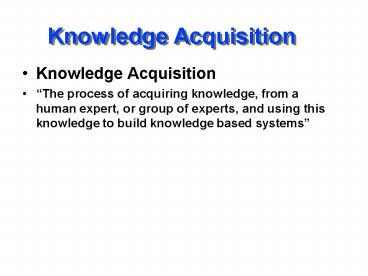Knowledge Acquisition PowerPoint PPT Presentation
1 / 23
Title: Knowledge Acquisition
1
Knowledge Acquisition
- Knowledge Acquisition
- The process of acquiring knowledge, from a human
expert, or group of experts, and using this
knowledge to build knowledge based systems
2
Knowledge Acquisition
inarticulate
argumentative
quickly bored
Delighted to talk to anyone and will exhaust any
knowledge engineer
3
Knowledge Acquisition
- Knowledge Acquisition Methods
- Computer tools
- Printed sources
- Interviews
- Unstructured
- Structured
- Event recall
- Questionnaires
- Formal techniques
- Observation techniques
4
Knowledge Acquisition
- Sources of Knowledge
- Procedure manuals
- Records of past case studies
- Standards documentation
5
Knowledge Acquisition
- The Interview
- An interview is a verbal and non verbal
interaction between two parties, with the
mutually agreed purpose of one party obtaining
information from, or about, the other, in order
that it may be used for a particular purpose
Discussion
Interview
Knowledge Engineer
Expert
6
Knowledge Acquisition
- Interview Methodology
- Successful interviewing requires -
- Planning
- Stage management techniques
- Social skills
- Self control
7
Knowledge Acquisition
- Interview Methodology
- Dont ask long, complicated or aggressive
questions - Ask one short, clear question and wait for an
answer - Speak the experts language
- Be aware of factors such as time, personality
etc. - Record the interview, - dont take notes
8
Knowledge Acquisition
- Interviews
- Approach the interview in an organised,
structured and professional manner - Advantages
- The knowledge engineer can satisfy both parties
that the relevant points have been grasped - Disadvantages
- Length of time to transcribe and analyse tapes
- Discrepancies between method described and method
used
9
Knowledge Acquisition
- Unstructured Interviews
- The most widely used K.A. method
- Used mainly in the early stages
- Consist of free flowing dialogue
- Spontaneous questions
- Little prior planning
- Tend to take on a life of their own
- Will rarely provide a complete or well organised
knowledge or process description
10
Knowledge Acquisition
- Structured Interviews
- Should be -
- Focused
- Relaxed
- Unhurried
- Interesting
- Informal
11
Knowledge Acquisition
agree sequence of topics
setting out goals
motivate the expert
Discuss agreed topics
Expert
Knowledge Engineer
Review the interview
12
Knowledge Acquisition
- Event Recall Interviews
- Actual cases are discussed
- Are good at revealing the actual decision making
process - Can be used to check completeness of earlier K.A.
sessions - Tend to degenerate into general discussion
13
Knowledge Acquisition
- Event Recall Interviews
- Questions may be asked such as -
- Could you talk me through that particular
decision making process? - What questions did you ask?
- In what order?
- Why did you ask those questions?
14
Knowledge Acquisition
- Forms
- Can be used to broadly itemise
the aims of the session - If given to the expert in advance
of the session can be used as an
agenda - The forms can be completed during
the interview and agreed by both
parties
15
Knowledge Acquisition
- Tutorial Interview
- Aims to familiarise the knowledge engineer with
the problem domain - The expert is asked to prepare
a short presentation on the
subject under investigation
16
Knowledge Acquisition
- Twenty Questions
- An interview in which the expert can only answer
yes or no - Aims to gather the major characteristics or
concepts of the domain - Alternatively, the knowledge engineer can be
supplied with a set of previously solved problems
and the expert poses the questions to the K.E.
17
Knowledge Acquisition
- Trigger interviews
- The K.E. issues materials within the interview
which are intended to trigger and stimulate the
experts memories and responses - May include structured structured diagrams
derived from earlier KA sessions - May also include archived data from past problem
solving instances
18
Knowledge Acquisition
- Introspective Interviews
- (Sometimes called think aloud interviews)
- Involve asking the expert how they would solve a
particular problem - The expert is asked to verbalise their thought
processes
19
Knowledge Acquisition
- Critical Instants
- The expert is asked to describe their experience
with remarkable or difficult cases - Can help to increase domain awareness
20
Knowledge Acquisition
Repertory grid
Elements
A list of people, objects or situations familiar
to the individual
Constructs
Elicited by means of a Repertory Test
Each element is rated by a scale
21
Knowledge Acquisition
Repertory grid for a Quality Control KBS
Elements
Adjustment to straighten sheet off-set
Scroll and cooling rails cleaned
Punch and dies changed
Scroll head position
Locators changed
Separator opened
Scroll timing
Cutter feed
Material
Constructs
Affect timing and feed before scroll
1
5
1
1
4
1
2
1
5
2
1
3
1
2
4
2
5
4
All of product
Bad rim before curler
1
5
5
4
1
1
5
4
3
Affects good or bad rim curler
1
3
1
3
1
4
1
3
1
2
3
5
1
3
2
2
1
4
Ragged trim at curler
22
Knowledge Acquisition
knowledge acquisition involving multiple experts
is fraught with the problems of dealing with
single experts compounded with obstacles and
risks of trying to co-ordinate human interactions
and integrate multiple knowledge bases
(La Salle and Medsker, 1991)
23
Knowledge Acquisition
- Knowledge Acquisition Tools
- The domain expert works directly with a
computerised acquisition tool such as - - Auinas...Elicits and models information using a
knowledge acquisition workbench including
repertory grid based interviewing - Mole...Exploits information about how problems
are solved to elicit diagnostic knowledge and
uses feedback to fine tune knowledge - Opal...Performs knowledge acquisition for the
cancer treatment domain

